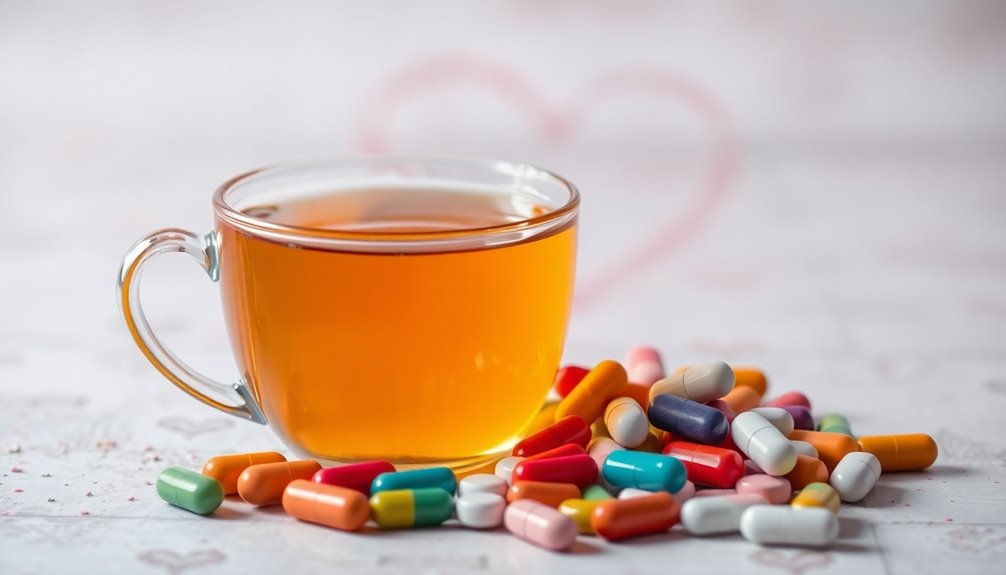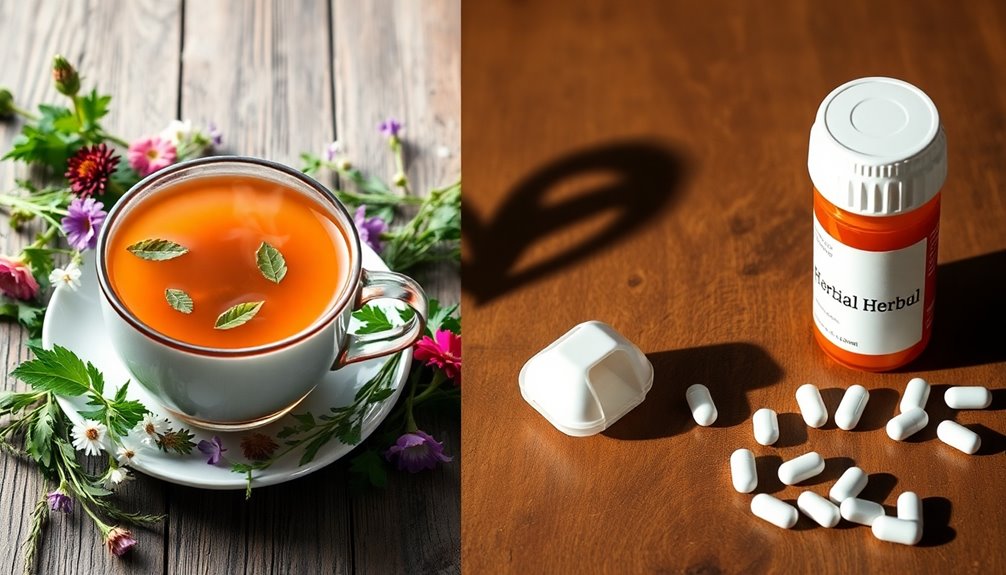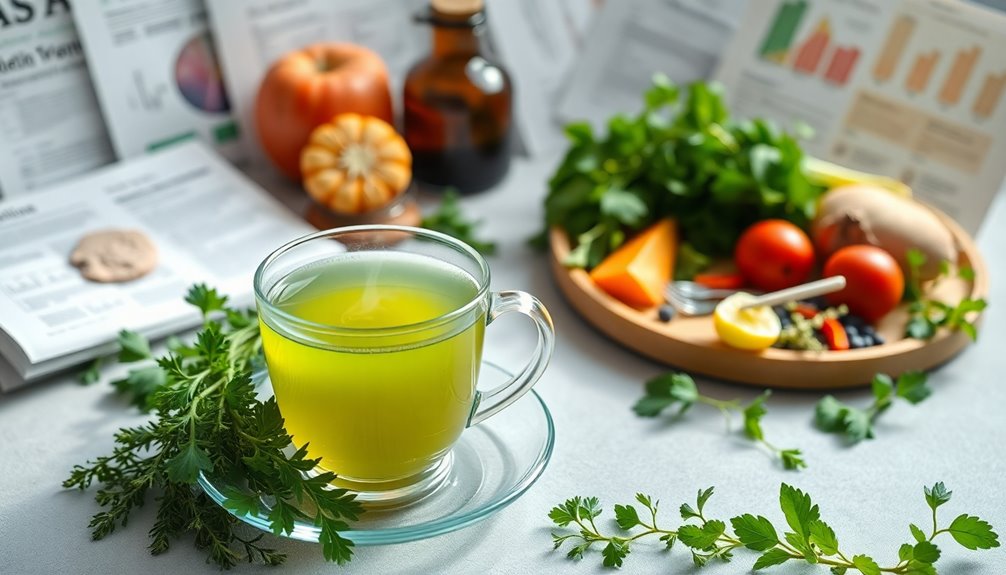Tea can be a delightful way to help your heart health! Drinking tea regularly might lower your chances of heart attacks and even help with blood pressure. Those yummy flavonoids in tea can work wonders, improving blood vessel function and reducing inflammation. But remember, tea is best enjoyed alongside your doctor's prescribed medications, not as a replacement! It's important to chat with your healthcare provider about your tea choices, especially if you're taking heart meds. If you're curious about more tips and tasty teas for your heart, there's plenty more to explore!
Key Takeaways
- Tea consumption can lower heart attack risk and improve overall heart health, but it should complement prescribed medications, not replace them.
- Flavonoids in tea may enhance blood vessel function and reduce inflammation, offering additional heart health benefits alongside medication.
- Individual responses to tea can vary; consulting a healthcare provider is essential for personalized advice related to heart health.
- Certain herbal teas may interact with heart medications, potentially reducing their effectiveness; caution is advised when combining them.
- While tea has heart health benefits, it may not be a substitute for necessary medications prescribed for existing heart conditions.
Introduction

When it comes to heart health, many people wonder about the benefits of tea compared to traditional medications. You might be surprised to learn that drinking tea, especially green and black varieties, can be good for your heart!
Studies show that tea drinkers might've a 20% lower risk of heart attacks and a 22% lower chance of dying from heart disease. That's pretty impressive, right? The secret lies in tea's flavonoids, which help reduce inflammation and improve how your blood vessels work.
But hold on! While tea can be a tasty part of a heart-healthy lifestyle, it shouldn't replace any medications your doctor prescribes.
Medications are designed to help manage heart conditions effectively, especially for those with existing issues. It's essential to remember that everyone's body is different, and what works for one person mightn't work for another.
Tea's Historical Medicinal Use

Tea's long history as a medicinal beverage highlights its significance in promoting heart health. For thousands of years, people have enjoyed tea for its many health benefits.
In ancient Chinese and Ayurvedic traditions, tea was more than just a drink; it was used as a remedy for various ailments, especially heart-related issues. The inclusion of beverages like yerba mate has also gained recognition for their potential health benefits, including those related to heart health.
Green tea was often chosen in traditional Chinese medicine because it was believed to help improve circulation and reduce inflammation. This made it a favorite for those wanting to care for their heart health.
Herbal teas, like chamomile and rooibos, have also been enjoyed for their calming effects and potential benefits for the heart.
Many cultures valued tea not just for its delicious taste but also for its rich content of flavonoids and antioxidants, which can help lower cholesterol levels and improve how your blood vessels work. Additionally, studies suggest that drinking tea regularly may contribute to overall cardiovascular health and reduce the risk of heart disease.
Tea May Lower Blood Pressure

Consuming tea regularly may offer a natural way to support heart health, particularly by lowering blood pressure. When you drink tea daily, especially green or black tea, you're enjoying a tasty treat that could help your heart. The flavonoids in tea can improve how your blood vessels work, making it easier for blood to flow smoothly.
Studies show that people who drink tea have a 20% lower risk of heart attacks and a 22% lower chance of dying from heart disease. That's pretty impressive! Research also suggests that the polyphenols in tea can reduce inflammation, which is a big player in high blood pressure and heart disease. If you're looking for ways to lower blood pressure, sipping tea might just be the answer.
Even a little tea can make a difference. A systematic review found that regular tea drinkers experienced small but helpful reductions in both systolic and diastolic blood pressure.
These benefits might be even more important for older folks, who often face more heart health challenges. So, why not brew a cup and enjoy the heart-loving perks of tea today?
Tea's Impact on Heart Rhythm

For those who enjoy a warm cup of tea, it's important to consider how it may affect your heart rhythm. Tea is a delightful drink, but it contains caffeine, which can influence your heart health. For example, an 8-ounce cup of black tea has about 47 mg of caffeine. Additionally, brewing the perfect cup can help ensure the optimal balance of flavor and caffeine content.
If you drink too much, it might cause your heart to beat faster or even lead to a condition called atrial fibrillation, especially in older adults. While sipping tea in moderation can be good for your heart, too much caffeine can raise blood pressure, which isn't great for your heart rhythm. If you already have heart problems, it's wise to keep an eye on how much caffeine you're consuming.
Don't forget that it's always best to chat with your healthcare provider if you're worried about how tea might impact your heart rhythm. They can help you figure out the right amount for your health. Additionally, consider incorporating natural remedies that may complement your heart health along with your tea consumption.
Tea's Interaction With Medications

When it comes to heart health, understanding how your favorite brews interact with medications is crucial. You might love sipping on herbal teas, but some, like St. John's Wort, can actually make heart medications, like digoxin, less effective. That could be risky if you have a heart condition!
Ginseng tea might be a tasty choice, but if you're on blood thinners, it's best to check with your doctor first, since it could increase bleeding risks. Additionally, certain herbs can have dangers for pets if ingested, so be mindful of your environment. Regular consumption of herbal extracts may also enhance overall vitality and wellbeing. Moreover, herbal teas like raspberry leaf tea are traditionally used to support women's health, which can contribute to overall wellness.
Don't forget about green and black teas! They've caffeine, which can affect your heart rate and blood pressure. If you have pre-existing heart issues, be cautious.
And if you're planning to have surgery, steer clear of chamomile tea before your big day, as it can enhance anesthesia effects.
While many teas are safe for daily enjoyment, remember to consult your healthcare provider if you're on specific heart medications. It's always smart to double-check! Additionally, practicing mindfulness and self-reflection can help you become more aware of how your body responds to different substances, including teas and medications.
Practical Applications

Incorporating tea into your daily routine can be a simple yet effective way to support heart health. If you enjoy being a tea drinker, you're in luck! Drinking green and black tea can lower your risk of heart problems.
Studies show regular consumption is linked to a 20% lower chance of having a heart attack and a 22% lower risk of dying from heart disease. That's pretty amazing!
The flavonoids in tea help improve blood vessel function and reduce inflammation, providing health benefits that work alongside any medications you might be taking.
While tea is great for your heart, it's important to remember it shouldn't replace prescribed medications. Your doctor knows your individual health profile best, so always consult with them about the right balance of tea and medicine.
Don't forget about herbal teas like rooibos! They can have unique health properties too, but always use them to complement your conventional heart medications.
Frequently Asked Questions
What Is the Best Drink for Your Heart and Arteries?
When choosing the best drink for your heart and arteries, consider tea. It's packed with flavonoids that reduce inflammation and improve blood vessel function, helping you maintain a healthier heart and lower cholesterol levels.
Should Heart Patients Avoid Tea?
If you're a heart patient, it's best to consult your healthcare provider about tea. Some types can interfere with medications or affect iron absorption. Always consider your individual health needs before making choices.
Does Tea Clean Arteries?
No, tea doesn't clean your arteries. While it contains beneficial flavonoids that support heart health, maintaining a balanced lifestyle and following prescribed treatments are essential for effective arterial health and cholesterol management.
What Is the Healthiest Food for Your Heart?
To support your heart health, focus on foods like fatty fish, whole grains, avocados, and dark chocolate. Incorporating these nutrient-rich options into your diet can significantly lower your risk of heart disease and improve overall wellness.
Conclusion
So, whether you love sipping tea or taking your medicine, both can help your heart in different ways! Tea has a rich history of healing and can even lower blood pressure. It's important to remember, though, that tea might interact with some medications, so always check with a grown-up or doctor first. Enjoying a warm cup of tea can be a fun way to take care of your heart, while also keeping it healthy and happy!










